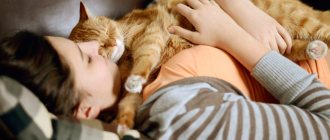Congratulations to your family on the addition! If you are reading this article, it means that you just recently got a kitten or even several babies. I want to play with these wonderful creatures more often, but they spend most of their time sleeping.
A logical question arises: is it worth worrying, and how long do kittens sleep normally? Let's figure it out.
Sleeping newborn kitten
Normal sleep duration for a kitten
Wild cats are predators that prefer to hunt prey at night. During the day they get enough sleep to regain strength. The sleep is sensitive, intermittent, the animal wakes up from the slightest rustle. Always on the alert. Pets do not have to get their own food; they live in favorable conditions, where they are fed to their fill, houses are built, and sleeping places are provided. They don’t need to hunt at night and be on “combat readiness” during the day, so they can afford to sleep longer – up to 18 hours a day. However, the life cycle features of wild and domesticated cats are similar. As for small cubs, their sleep duration is much longer than that of adult animals.
Newborn kittens, as well as babies under two months of age, sleep almost constantly. At this stage, the formation of the digestive, nervous, immune, and muscular systems occurs, so a lot of strength is required. During sleep, energy is replenished. After 2 months, accelerated body growth begins; at 4 months, the kitten reaches the size of an adult cat. During sleep, protein foods are digested and strength is accumulated for the waking period. In addition, babies are very playful and active, which also wastes energy. Kittens sleep a lot due to natural changes in their bodies.
You should not disturb or wake up a small pet. This behavior of the owner provokes cat diseases, weakness, malaise, and impaired physical development. With age, the duration of long sleep in kittens decreases; they begin to sleep 15-18 hours a day, depending on their individual characteristics and lifestyle.
Photos of cats sleeping in different poses, which are impossible to look at without emotion.
It is generally believed that cats like to sleep curled up on something soft. However, this is by no means true! They can sleep anywhere - in a tight box, in a vase, in a shoe... And the positions in which they do this are sometimes simply unimaginable.
However, no matter where or what position they sleep in, they look damn cute. Because it’s simply impossible to look at these fluffies without emotion. However, what can I say – it’s better to see for yourself. And then don’t forget to share these photos with your loved ones to cheer them up and bring a little warmth and tenderness to their day.
Sleep phases in kittens
Modern scientists have found that cat sleep is divided into 2 phases, which are absolutely not similar to each other.
- Shallow . Similar to a nap. This is slow or low wave sleep. The pet curls up into a ball, closes its eyes, but quickly reacts to the slightest rustle or touch. The cat can wake up at any moment. During low-wave sleep, muscles tense, pulse slows, blood pressure and body temperature drop, and metabolic processes slow down.
- Deep . Called REM sleep. Characterized by noticeable eye movement. Occurs 10-30 minutes after light sleep. The peculiarity of the phase is the complete shutdown of consciousness. A cat may inadvertently fall from a chair on which it is poorly positioned. The animal periodically changes its body position, but does not wake up. Often stretches out to its full height, spreading its legs. The surprising thing is that during deep sleep, brain activity does not decrease; it is the same as during wakefulness - when hunting, playing. However, blood pressure and body temperature decrease, pulse decreases, and breathing becomes uneven.
The rate at which an animal emerges from deep sleep is 300 times slower than shallow sleep. You can pet your pet lightly and it will sleep. Scientists have also found that cats dream. At the same time, they meow, squeak, sigh deeply, twitch their antennae and eyebrows.
How do I get my kitten to sleep on a schedule?
If you're looking for ways to get your new kitten sleep-trained, you'll be relieved to know that there are some pretty foolproof methods. If you start adding them to your cat's daily routine, you will quickly notice a difference.
Developing a sleep cycle that suits your kitten is a great way to ensure that your new supplement is designed to provide the right amount of sleep and that they can get quality sleep too. The best part is that it's not even difficult and just requires a little planning on your part.
Our first suggestion is to always stick to your cat's sleep schedule. Set your cat's food at the same time every day by cleaning their litter box. This will help the kitten get into a rhythm.
© shutterstock
It is recommended to take into account the feeding time of the kitten. When you feed your cat later in the evening, you will find that a fuller belly may make her drowsy. By moving food closer to bedtime, your cat will likely sleep more deeply afterwards.
Soon they will have a basic understanding of when each task will be performed, including when it is time to go to bed. This may be more helpful as your cat gets older and sleeps less, but it's something to keep in mind back in the days when she was a little kitten.
Causes of drowsiness in kittens
In addition to natural physiological reasons, the duration of a cat’s sleep is influenced by external factors:
- Lifestyle;
- nutrition;
- weather;
- presence of irritants.
Kittens sleep longer if they are fed and have played a lot. Prolonged sleep is needed to fully recuperate. A short period of wakefulness on hot, sultry days, before rain, when atmospheric pressure decreases, the level of nitrogen in the air increases. Hormonal levels influence sleepiness. Females sleep longer. In addition, the activity of pets directly depends on the breed. If the kitten sleeps a lot, but during the waking period shows normal activity and looks completely healthy, there is no reason to panic. When the baby grows up, gains strength, changes his lifestyle, the regime will change.
Possible factors that prevent your baby from sleeping
An insufficient amount of daytime sleep leads to a decrease in the functioning of certain vital systems in the body and disruption of the proper development of many processes. During sleep, the baby’s body prepares to perceive new impressions; the lack of proper rest can provoke the appearance of mental disorders.
Reasons why a child at three months does not sleep well, may sleep very restlessly or wake up all the time:
Physical discomfort
A baby at three months does not yet know how to express what he feels in words, so he will cry or grunt, attracting the attention of his mother. Discomfort can be due to external irritants: loud noise, incorrect temperature conditions in the room (hot, cold, dry air), wet diapers or a dirty diaper. Overexcitement and hyperactivity
The large amount of information that a baby receives throughout the day greatly affects the baby’s psycho-emotional state. As a result, the child cannot calm down and get a good night's sleep. Diseases. Disturbances in the functioning of the central nervous system (CNS) and somatic diseases affect the quality of daytime sleep or lead to its absence. You can talk about neurological problems if all attempts to eliminate the above factors have been excluded, and after contacting a neurologist.
The child does not want to fall asleep during the day
Symptoms of diseases with drowsiness
A cause for concern is the baby's unhealthy appearance and passive behavior. Diseases can be identified by the following signs:
- refusal of food, water;
- dry or too wet nose;
- lethargy;
- limb weakness;
- brittle wool;
- increased body temperature;
- underweight;
- plaintive meow.
With the help of sleep, the animal tries to overcome the disease, but it does not always work. To restore the kitten's strength, the intervention of a veterinarian or a change in the owner's attitude is required. For example, you should change the food, take your pet for a walk when it is fresh, etc.
After sterilization
It should be noted that after sterilization surgery, the cat does not eat and sleeps all the time; this is a normal state after anesthesia. If this period lasts for 24 hours, then there is nothing to worry about. If a day has passed and the condition does not change, you need to urgently see a veterinarian.
During the first 24 hours, you don’t need to force the cat to get up or wake him up if she doesn’t want to. Just like insisting on food and drink. Give her a little rest, recover, and she will again delight you with her cheerful appearance.
If the anesthesia has not worn off and the cat is not sleeping, gets up and tries to move around the apartment, do not let it out of sight so that it does not accidentally get injured. It’s better to take her in your arms, calm her down, and maybe she’ll fall asleep. Sleep is the best medicine here.
Possible diseases with symptoms of drowsiness
If the kitten has become lethargic and constantly sleeps, illness may be the cause. Drowsiness is caused by:
- food poisoning;
- intestinal obstruction;
- urolithiasis disease;
- bruises, dislocations, injuries;
- parasitic infections.
In most cases, there are no additional symptoms at first. Only lethargy, apathy, weakness, loss of appetite, and prolonged sleep are observed. To find out the cause of the disease, you need to undergo an examination by a veterinarian. Moreover, the cat sleeps all day long for the following reasons:
- anemia;
- allergies;
- oncological tumor;
- leukemia;
- gastritis;
- retoroviruses;
- kidney inflammation;
- colds.
In this case, it is impossible to determine the diagnosis on your own, with the exception of colds, when there is coughing, sneezing, and nasal discharge.
Diseases occurring with lethargy
Almost all cat diseases are accompanied by increased drowsiness, so only a veterinarian can determine the root cause of the anxious state. The most common pathologies include:
- Parasitic diseases, which can be either quite serious (demadecosis) or ordinary infestation with fleas or ticks. The cat’s condition is impaired due to the release of toxic saliva of parasites into the blood, and the more of it enters the body, the worse the animal becomes.
- Worm infestations are one of the most common causes, leading not only to disruption of the pet’s daily routine, but also to rapid weight loss. Proper treatment can quickly get rid of worms, but only a veterinarian should prescribe it.
- Poisoning from foods, chemicals, plants or any other foreign objects. A severe form of poisoning is accompanied by diarrhea, continuous vomiting, and increased body temperature - it can only be treated in a clinic. A mild form without excessive vomiting and diarrhea can be treated at home.
- Injuries of various origins, which can only be identified using x-rays. In this case, rest is considered the best medicine for a speedy recovery.
- Urolithiasis, the main symptoms of which are lethargy, drowsiness, rare and painful urination.
- Intestinal obstruction is a dangerous pathology that most often affects older animals. The disease develops due to the accumulation in the intestines of a large amount of hair that enters the body during licking.
If any alarming symptoms appear, it is recommended to immediately visit a veterinarian. In some cases, delay can lead to dangerous complications or even death of the animal.
Actions for drowsiness in kittens
In the absence of pathological reasons, you can ensure normal development of the baby and shorten the duration of sleep as follows:
- choose the right diet;
- avoid overeating or starvation;
- protect from external noise;
- arrange a place to sleep;
- do not disturb during sleep;
- watch out for small children who may harm kittens;
- provide access to fresh air in the apartment or house;
- carry out preventive protection against helminths and fleas.
If the cat constantly sleeps, looks sick, refuses to eat, or has other alarming symptoms, it needs to be shown to a veterinarian.
At an early age, not all animals are the same, even if they were born by the same mother. Strong babies quickly adapt to the external environment and new nutrition, while weak ones require more effort. If a kitten sleeps for a long time and plays little, this does not mean that he is sick. The main indicator of health is a good appetite. In this case, food should be nutritious and age-appropriate. Mature kittens aged about 4 months can sleep for a long time during the day due to their nocturnal lifestyle. If the baby is raging, rolling up rugs, at night, during the day he regains his strength. Purrs that live outside come into the house occasionally and sleep less than their indoor relatives.
Why are 2 cats good?
A couple of years ago, having ONE cat was a huge responsibility for me, which I didn’t dare to take on. There were many reasons: moving around rented apartments, “what if there’s a war tomorrow,” and what if the cat is alone all day. and so on.











